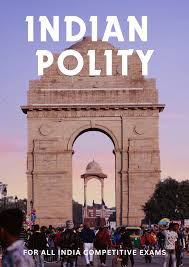Question Papers
Select Flexible papers options for all the test
Polity Mock Test I
 No Of Questions : 100
No Of Questions : 100
 Duration: 00:30:00
Duration: 00:30:00
 Total Mark: 100
Total Mark: 100
Polity Mock Test 2
 No Of Questions : 100
No Of Questions : 100
 Duration: 00:30:00
Duration: 00:30:00
 Total Mark: 100
Total Mark: 100
Polity Mock Test 3
 No Of Questions : 100
No Of Questions : 100
 Duration: 00:30:00
Duration: 00:30:00
 Total Mark: 100
Total Mark: 100
Polity Mock Test 4
 No Of Questions : 100
No Of Questions : 100
 Duration: 00:30:00
Duration: 00:30:00
 Total Mark: 100
Total Mark: 100
Polity Mock Test 5
 No Of Questions : 100
No Of Questions : 100
 Duration: 00:30:00
Duration: 00:30:00
 Total Mark: 100
Total Mark: 100
Polity Mock Test 6
 No Of Questions : 100
No Of Questions : 100
 Duration: 00:30:00
Duration: 00:30:00
 Total Mark: 100
Total Mark: 100
Polity Mock Test 7
 No Of Questions : 100
No Of Questions : 100
 Duration: 00:30:00
Duration: 00:30:00
 Total Mark: 100
Total Mark: 100
Polity Mock Test 8
 No Of Questions : 100
No Of Questions : 100
 Duration: 00:30:00
Duration: 00:30:00
 Total Mark: 100
Total Mark: 100
Polity Mock Test 9
 No Of Questions : 100
No Of Questions : 100
 Duration: 00:30:00
Duration: 00:30:00
 Total Mark: 100
Total Mark: 100
Polity Mock Test 10
 No Of Questions : 100
No Of Questions : 100
 Duration: 00:30:00
Duration: 00:30:00
 Total Mark: 100
Total Mark: 100

- Price: ₹100, Total Mock: 10
POLITY
Some quick example text to build on the card title and make up the bulk of the card's content.
Select your exam below and give an immediate push to your preparation
Explore our range of courses


Polity forms an integral part of competitive exams in India, providing candidates with essential knowledge about the country's governance, legal framework, political processes, and administrative systems. A thorough understanding of polity is essential for success in various competitive exams and for pursuing careers in government, public administration, law, and politics.Indian Polity Governance ”is one of the important parts of Exams like UPSC, NDA, CDS, SSC, Railways, Banking and other similar competitive exams.
Weightage of polity in SSC CGL exam is 5 to 6 questions. It increase your 10 to 12 marks and Polity is one of scoring subject.
The syllabus for the Polity section of the SSC CGL (Staff Selection Commission - Combined Graduate Level) exam typically covers various topics related to the Indian Constitution, governance, and political system. Here's a general outline:
Indian Constitution:
The syllabus for the Polity section of the SSC CGL (Staff Selection Commission - Combined Graduate Level) exam typically covers various topics related to the Indian Constitution, governance, and political system. Here's a general outline:
Indian Constitution:
- Preamble: Importance, objectives, and key features.
- Parts of the Constitution: Fundamental Rights, Directive Principles of State Policy, Fundamental Duties, Amendment Procedures, etc.
- Schedules: Important schedules and their provisions.
- Citizenship: Types of citizenship, acquisition, and loss of citizenship.
Union Government:
- President: Powers, election, impeachment process, and role.
- Vice-President: Election, functions, and role.
- Prime Minister and Council of Ministers: Appointment, powers, functions, and responsibilities.
- Parliament: Composition, powers, sessions, types of bills, legislative procedures, etc.
- Parliamentary Committees: Types and functions.
- Supreme Court: Composition, powers, jurisdiction, and judicial review.
State Government:
- Governor: Powers, appointment, and role.
- Chief Minister and Council of Ministers: Appointment, powers, functions, and responsibilities.
- State Legislature: Composition, powers, sessions, legislative procedures, etc.
- High Courts: Composition, powers, jurisdiction, and judicial review.
Local Government:
- Panchayati Raj Institutions (PRIs): Structure, functions, and significance.
- Municipalities: Structure, functions, and significance.
Constitutional Bodies and Commissions:
- Election Commission: Composition, powers, functions, and significance.
- Finance Commission: Composition, functions, and role.
- Union Public Service Commission (UPSC): Composition, functions, and role.
- State Public Service Commissions: Composition, functions, and role.
Fundamental Rights and Duties:
- Fundamental Rights: Provisions, significance, limitations, and enforcement.
- Fundamental Duties: Provisions, significance, and enforcement.
Amendments and Acts:
- Important Constitutional Amendments.
- Key Acts and Legislations related to governance, administration, and social justice.
Candidates preparing for the SSC CGL/CHSL other competitive exams should focus on understanding the provisions of the Indian Constitution, the structure of the Indian government, the role of constitutional bodies, and recent developments in Indian polity. Regular practice of previous years' question papers and mock tests is essential for thorough preparation
Disclaimer: This app is not affiliated with, endorsed by, or representative of any government entity. The information provided is for informational purposes only and does not constitute official advice or services. For authoritative information, please consult the relevant government agency directly.